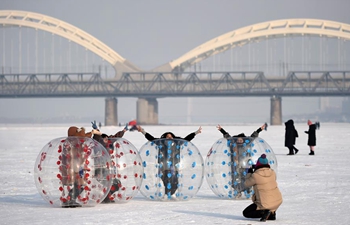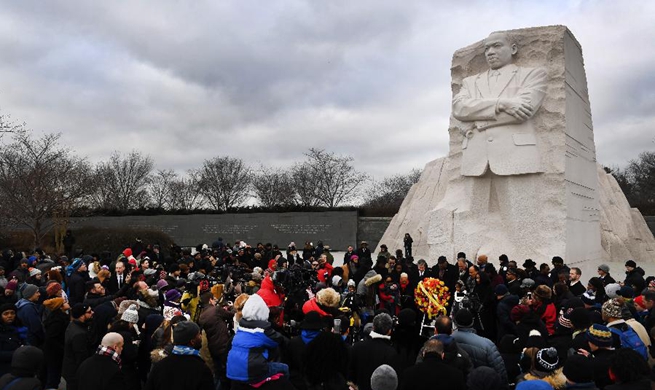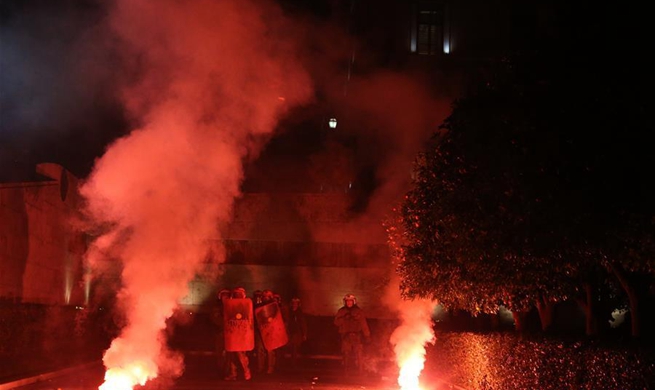BEIJING, Jan. 16 (Xinhua) -- Li Lin was anxious to register her daughter in a public kindergarten shortly after her birth, hoping that her child could secure a place at three years old.
Li lives in Beijing's Chaoyang District and finds that her nearest first-class public kindergarten is in high demand among parents.
"The mothers in my neighborhood said that the competition for a good kindergarten is no less intense than that for universities," Li said.
Besides the chronic shortage of kindergarten supply, a recent child abuse scandal in a private kindergarten has also increased Li's anxiety.
"How to find a sound and reliable kindergarten for my daughter is constantly swirling in my mind," Li said.
Li is one of the typical Chinese parents who value children's early education and have high expectations for kindergartens. However, there is a gap between parents' expectations and the services provided.
A report from the Education Policy Center of Southwest University shows that with China's implementation of the two-child policy in 2016, the demand for preschool education will see a sharp increase from 2019 and reach its peak in 2021. The report estimates shortfall of 11,000 kindergartens and 3 million kindergarten teachers by then.
According to the report delivered at the 19th National Congress of the Communist Party of China in October, China will make steady progress in ensuring people's access to childcare.
China is taking measures to tackle the shortfall by providing incentives to kindergartens and increasing enrollment quotas amid a growing need for quality kindergartens and sound preschool education.
Starting 2018, Beijing will offer a 10,000 yuan (around 1,550 U.S. dollars) subsidy for each increased enrollment quota in both public and private kindergartens. It will also offer a 1,000 yuan (around 155 U.S. dollars) financial subsidy for each child in first-class public kindergartens and 700 yuan for other kindergartens.
Beijing Education Commission is pushing for the reconstruction and enlargement of kindergartens. Beijing has also intensified supervision of kindergartens. By the end of 2017, 893 unlicensed kindergartens were banned.
Guangdong Province issued the guideline on increasing kindergarten supply in December 2017. Guangdong is calculating the gap in kindergarten enrollment quota and speeding up the construction of kindergartens accordingly. It also encourages social forces such as institutions and enterprises to set up kindergartens.
Guangzhou's budget proposal in 2018 released last week shows that the city has allocated 890 million yuan (138 million U.S. dollars) for preschool education, an increase of 470 million yuan (73 million U.S. dollars), up 112 percent from 2017.
The lack of kindergarten teachers has also become a major constraint for China's development of preschool education.
At a teacher recruitment fair in December 2017, 58 kindergartens from Shanghai's Jiading District were planning to recruit 281 teachers, but they only received 70 qualified applicants.
Li Yan, director of the Preschool Education Department of Shanghai Normal University, said that Shanghai adds nearly 3,000 preschool teacher jobs each year, while the number of preschool education university graduates in Shanghai is far from enough.
"Preschool education graduates are in short supply and students are booked long before graduation. It is common for 200 kindergartens to compete for only 100 preschool education graduates," Li said.
Zhang Wei, 22, works in a private kindergarten in Chaoyang District in Beijing. She has a tight schedule every day including teaching classes, organizing outdoor activities for nearly 30 children, attending meetings and dealing with all kinds of inquiries from parents.
Zhang has to maintain constant vigilance about the safety of lively children who are prone to injury and minor accidents, which brings a lot of psychological pressure.
"Sometimes I wake up from nightmares in which a boy strikes his head on the edge of the table and I am scolded by the headmaster and the boy's parents," Zhang said.
In China, the income of kindergarten teachers is generally low. In some big cities such as Beijing, kindergarten teachers are paid around 3,000 yuan (460 U.S. dollars) to 5,000 yuan (768 U.S. dollars) every month, even less than the wages for most hourly workers and some babysitters.
Kindergarten teachers in the public education system earn less than their primary school equivalents. They also have fewer advantages in professional title evaluation, which is linked to reputation, salary and welfare. According to the Ministry of Education, of the 2.5 million kindergarten teachers and headmasters in 2016, 73 percent were not granted any professional title.
Yu Yongping, director of the China National Society of Early Childhood Education, said that the increasing fund for kindergarten should not only focus on the buildings and equipment, but it should also be used in providing better salaries for kindergarten teachers to ensure a sound talent pool for kindergartens.
"The income and status of kindergarten teachers should be increased. That will help attract and retain qualified teachers for kindergartens," Yu said.

















